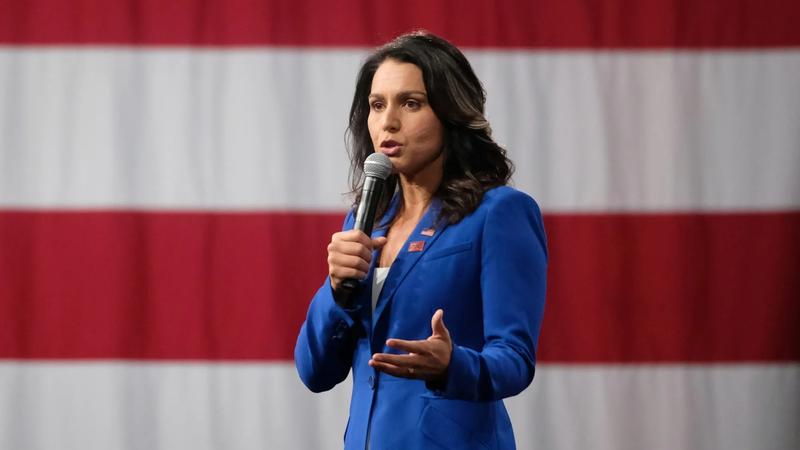Published 21:39 IST, October 23rd 2024
1st Hindu US Congresswoman Tulsi Gabbard Joins Republican Party
“I’m proud to stand here with you today, President Trump, and announce that I’m joining the Republican Party," she said.

Tulsi Gabbard, the first Hindu woman ever elected to the U.S. Congress , has officially joined the Republican Party. Gabbard made the announcement on Tuesday, October 22, during a rally hosted by former U.S. President Donald Trump in Greensboro, North Carolina, a crucial swing state in the upcoming U.S. presidential election.
Gabbard, who left the Democratic Party in 2022 and has since identified as an independent, cited her admiration for Trump's leadership and his efforts to transform the Republican Party as key factors behind her decision.
Gabbard highlighted GOP's roots
“I’m proud to stand here with you today, President Trump, and announce that I’m joining the Republican Party. I am joining the party of the people," Gabbard said at the rally. She praised the Republican Party’s history, saying it was “the party of equality” and highlighted its founding principles of fighting against slavery. Gabbard added, "It is the party of common sense and the party that is led by a president who has the courage and strength to fight for peace."
A deeper look at GOP's roots
The Republican Party, often referred to as the GOP (Grand Old Party), was founded in 1854 by a coalition of anti-slavery activists, former Whigs, and Free Soilers who were united by a common goal: to oppose the expansion of slavery into the western territories of the United States.
At the time, the issue of slavery had become a major point of contention in American politics. The Kansas-Nebraska Act of 1854, which allowed new territories to decide for themselves whether to permit slavery, was a key catalyst for the formation of the Republican Party. Many Northern politicians and citizens were outraged by the Act, seeing it as an attempt to spread slavery into areas where it had previously been banned by the Missouri Compromise.
The new Republican Party positioned itself as the party of freedom and equality, with a strong anti-slavery platform. Its first presidential candidate, John C. Frémont, ran in 1856 with the slogan "Free soil, free labor, free speech, free men." Although Frémont lost, the party gained national prominence.
In 1860, the Republican Party’s anti-slavery platform helped propel Abraham Lincoln to the presidency. Lincoln’s election was a turning point in American history. His opposition to the expansion of slavery into new territories and his commitment to preserving the Union were central to his presidency. When Southern states seceded after his election, the nation was plunged into the Civil War.
During the Civil War, Lincoln and the Republican Party took decisive action against slavery. In 1863, Lincoln issued the Emancipation Proclamation, which declared that all enslaved people in the rebellious states were to be set free. This was followed by the passage of the 13th Amendment in 1865, which formally abolished slavery throughout the United States.
The early Republican Party's commitment to ending slavery and promoting equality established it as a champion of civil rights in the post-Civil War era. In the years following the war, the Republican-dominated Congress passed a series of Reconstruction-era amendments and laws aimed at securing the rights of newly freed African Americans. The 14th Amendment granted citizenship to all persons born or naturalized in the U.S., and the 15th Amendment guaranteed voting rights regardless of race.
Over time, the party’s platform and policies have evolved, but its origins as a party born out of the fight against slavery remain a defining part of its legacy.
Here is what you need to know
Gabbard had recently become an honorary co-chair of Trump's transition team, along with Robert F. Kennedy Jr., another former Democrat. Her alignment with Trump’s campaign signals her growing support for his leadership.
Trump, visibly pleased, expressed his surprise and gratitude for Gabbard’s decision, saying, "Thank you very much, Tulsi. That’s great. Wow, that was a surprise. She’s been independent for a long time. That’s a great thing. A great honor. Thank you very much, Tulsi."
Gabbard’s shift to the Republican Party marks a significant development in the political landscape.
Updated 21:40 IST, October 23rd 2024




